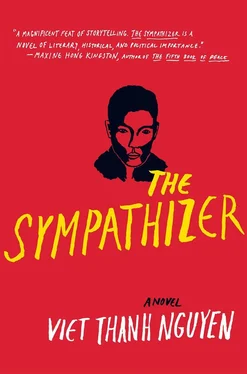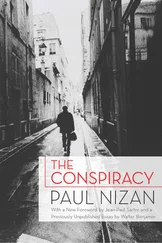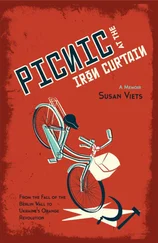That is a very good idea, the doctor said, patting the pages of my manuscript and nodding with satisfaction. You are nearly done, my boy. You are nearly done.
I had not seen the commissar since the examination’s conclusion. He had left me alone to begin my recovery, and I can only think that it was because he, too, was conflicted over what he had done to me, even though what was done to me had to be done, for I had to come to the answer myself. No one could tell me the solution to his riddle, not even him. All he could do was speed up my reeducation through the regrettable method of pain. Having used such a method, he was reluctant to see me again, reasonably expecting my hatred. Meeting him in his quarters for our next and last meeting, I could see that he was uneasy, offering me tea, tapping his fingers on his knees, studying the new pages I had written. What do a torturer and the tortured say to each other after their climax has passed? I did not know, but as I sat watching him from my bamboo chair, still bisected into myself and another, I detected a similar division in him, in the horrible void where a face had been. He was the commissar but he was also Man; he was my interrogator but also my only confidant; he was the fiend who had tortured me but also my friend. Some might say I was seeing things, but the true optical illusion was in seeing others and oneself as undivided and whole, as if being in focus was more real than being out of focus. We thought our reflection in the mirror was who we truly were, when how we saw ourselves and how others saw us was often not the same. Likewise, we often deceived overselves when we thought we saw ourselves most clearly. And how did I know that I was not deluding myself as I heard my friend speak? I do not. I could only try to understand whether he was fooling me as he skipped the pleasantries of inquiring about my dubious health, physical and mental, and announced that Bon and I were leaving both camp and country. I had assumed that I would die here, and the finality of what he was saying startled me. Leave? I said. How?
A truck is waiting for you and Bon at the gates. When I heard you were ready to see me, I wanted to waste no more time. You are going to Saigon. Bon has a cousin there, who I am sure he will contact. This man has already tried twice to flee from this country and been caught both times. This third time, with you and Bon, he will succeed.
His plan left me in a daze. How do you know that? I said at last.
How do I know? His void was without expression, but his voice was amused and, perhaps, bitter. Because I bought your escape. I’ve sent money to the right officials, who will make sure the right police officers look the other way when the time comes. Do you know where the money comes from? I had no idea. Desperate women will pay any price to see their husbands in this camp. The guards take their portion and leave the rest to the commandant and myself. I send some home to my wife, I pay my tithe to my superiors, and I used the remainder for your escape. Isn’t it remarkable that in a communist country money can still buy you anything you want?
It’s not remarkable, I muttered. It’s funny.
Is it? I can’t say I laughed in taking the money and gold of these poor women. But you see, while a confession may be enough to free you from this camp, given your revolutionary background, nothing less than money will free Bon. The commandant must be paid, after all — a considerable sum, too, given Bon’s crimes. And nothing less than a great deal of money will ensure that the two of you can leave our country, as you must. This, my friend, is what I have done to these women out of friendship for you. Am I still the friend you recognize and love?
He was the faceless man who had tortured me, for my own good, for the sake of nothing. But I could still recognize him, for who but a man with two minds could understand a man with no face? I embraced him then and wept, knowing that while he was setting me free, he himself could never be free, unable or unwilling to leave this camp except through death, which at least would be a relief from his living death. The only benefit from his condition was that he could see what others could not, or what they might have seen and disavowed, for when he looked into the mirror and saw the void he understood the meaning of nothing.
But what was this meaning? What had I intuited at last? Namely this: while nothing is more precious than independence and freedom, nothing is also more precious than independence and freedom! These two slogans are almost the same, but not quite. The first inspiring slogan was Ho Chi Minh’s empty suit, which he no longer wore. How could he? He was dead. The second slogan was the tricky one, the joke. It was Uncle Ho’s empty suit turned inside out, a sartorial sensation that only a man of two minds, or a man with no face, dared to wear. This odd suit suited me, for it was of a cutting-edge cut. Wearing this inside-out suit, my seams exposed in an unseemly way, I understood, at last, how our revolution had gone from being the vanguard of political change to the rearguard hoarding power. In this transformation, we were not unusual. Hadn’t the French and the Americans done exactly the same? Once revolutionaries themselves, they had become imperialists, colonizing and occupying our defiant little land, taking away our freedom in the name of saving us. Our revolution took considerably longer than theirs, and was consideraby bloodier, but we made up for lost time. When it came to learning the worst habits of our French masters and their American replacements, we quickly proved ourselves the best. We, too, could abuse grand ideals! Having liberated ourselves in the name of independence and freedom — I was so tired of saying these words! — we then deprived our defeated brethren of the same.
Besides a man with no face, only a man of two minds could get this joke, about how a revolution fought for independence and freedom could make those things worth less than nothing . I was that man of two minds, me and myself. We had been through so much, me and myself. Everyone we met had wanted to drive us apart from each other, wanted us to choose either one thing or another, except the commissar. He showed us his hand and we showed him ours, the red scars as indelible as they were in our youth. Even after all we had been through, this was the only mark on our body. We clasped hands and he said, Before you leave, I have something to give you. From beneath his desk he retrieved our battered rucksack and our copy of Asian Communism and the Oriental Mode of Destruction . The last we had seen it, the book was nearly falling apart, creased deeply at the spine. The binding had finally torn apart, and a rubber band bound the book’s two halves. We tried to refuse it, but he slipped the book in the rucksack and pressed it on us. In case you ever need to send me a message, he said. Or vice versa. I still have my copy.
Reluctantly, we took the rucksack. Dear friend—
One more thing. He picked up our manuscript, the copy of our confession and everything after, and motioned for us to open the rucksack. What happened in that examination room is between us. So take this with you, too.
We just want you to know—
Go! Bon is waiting.
So we went, rucksack over our shoulders, dismissed for the last time. No more pencils, no more books, no more teacher’s dirty looks. Silly rhymes and childish wordplay, but if we had thought of anything more serious we would have fallen down under the weight of disbelief, of our sheer relief.
The baby-faced guard escorted us to the camp gates, where the commandant and Bon stood by an idling Molotova truck. We had not seen Bon in a year and many months, and the first words he said were, You look like hell. Us? What about him? Our disembodied minds laughed, but our embodied selves did not. How could we? Our poor friend stumbled before us in patchwork and rags, a puppet in an alcoholic’s hands, hair thinning and skin a sickly shade of decayed jungle vegetation. Over one eye he wore a black patch, and we knew better than to ask him what had been done to him. A few meters away, behind barbed wire, three other haggard men in shambolic clothing watched. It took us a moment to recognize our comrades, the Hmong scout, the philosophical medic, and the dark marine. You don’t look like hell, the Hmong scout said. You look worse. The philosophical medic managed a grin with half his teeth missing. Don’t pay him any attention, he said. He’s just jealous. As for the dark marine, he said, I knew you bastards would get out of here first. Good luck to you.
Читать дальше












